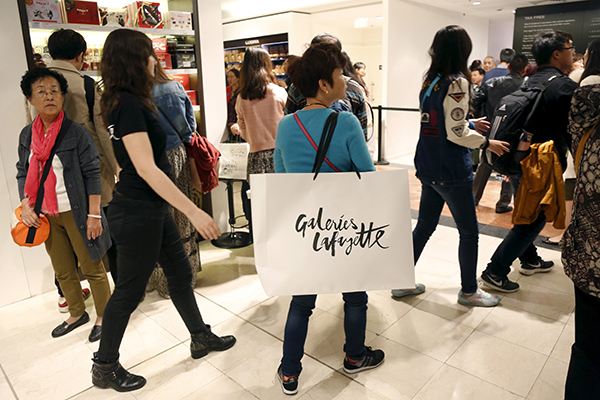 |
|
Customers visit the Galeries Lafayette department store in Paris, France, September 23, 2015. [Photo/Agencies] |
The luxury goods industry has suffered from slowing Chinese demand, while terror attacks worldwide have hurt tourism and travelers' spending on luxury items this year.
But even with falling earnings growth and sales that UBS Group AG warns may worsen, many luxury goods makers have increased their dividends in a bid to lure investors, Societe Generale SA analysts wrote in note last month.
The strategy hasn't worked in the past year, with a Morgan Stanley index of shares tracking firms with high and sustainable payouts slumping 16 percent, three times more than the Stoxx Europe 600 Index.
Higher dividends at a handful of struggling posh-product makers are a luxury they may not be able to afford-that appears to be the consensus view.
Take Richemont and Tod's SpA, for example. Both are down more than 20 percent this year and both are still squarely in the sights of short sellers.
Lingering expectations that they'll raise dividends even after reporting declining sales are attracting bearish traders.
"Despite the softening of their business in some of their key-growth markets, these companies are still growing their dividends," said Simon Colvin, an analyst at IHS Markit Ltd in London. "It doesn't take a lot for the dividend to become unsustainable. You have to be very wary as a dividend investor-that high yield sometimes carries risk."
While Richemont forecast operating profit slumped 45 percent in the first half, analysts see it raising its dividend for an eighth year. For Tod's, which posted a sixth semester of falling earnings, payouts are projected to climb 15 percent.
The companies have some of the most generous dividend yields in the BI Europe Luxury Goods Top Peers, and their short interest of more than 6 percent is among the highest, according to data compiled by Bloomberg and Markit.
Like them, Salvatore Ferragamo SpA and Hugo Boss AG are some of the companies most bet-against in the sector, with a short interest of more than 5 percent and shares down this year.
Their payout yield is higher than the average for members of the luxury index, even though they're struggling to turn themselves around. Swatch Group AG, whose first-half profit was the worst in seven years, also has a dividend rate higher than the mean. With a short interest of 27 percent, it's the most-shorted company of the regional Stoxx Europe 600 Index.
LVMH Moet Hennessy Louis Vuitton SE and Kering SA's payout yields are also higher than the industry's average, but the difference is that some of their units have shown an increase in demand. Their stocks are up this year, and their short interest of less than 1.2 percent is lower than the average for the industry.
Hermes International SCA, which scrapped its annual sales growth target, has one of the lowest dividend yields among peers. Its short interest is at 0.7 percent, and the shares are up 14 percent this year.
Even if firms have managed to maintain high payouts so far, the worsening sales will eventually hit, according to Benno Galliker, a trader at Luzerner Kantonalbank AG in Lucerne, Switzerland.
Bloomberg
